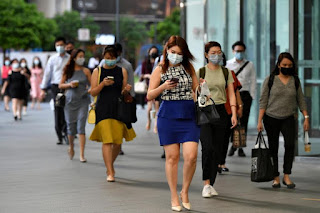8 key changes to take note of in Singapore in new year
From Jan 1, Singapore will ease its default work-from-home stance and allow 50 per cent of those who can work from home to return to the office. ST PHOTO: LIM YAOHUI
As Singapore ushers in the new year, here are eight key changes to take note of in 2022:
- Back to the office, subject to vaccination measures
- Tray return and table littering enforcement at foodcourts and coffee shops
- National Care Hotline hours shortened
- Fines for errant road cyclists doubled; size of cycling groups capped
- CPF contribution rate raised for older workers
- Changes to Basic Healthcare Sum and Basic Retirement Sum
- Higher tax relief for CPF members who top up accounts
- Police to get new powers under amendments to Police Force Act
Littering rules at coffee shops, food courts to start on Jan 1
Food court, coffee shop diners who do not clear tables will face fines from Jan 1
Diners at food courts and coffee shops who do not clear their tables will face fines from Jan 1, 2022, the National Environment Agency (NEA) said on Monday (Aug 30).
The enforcement approach at these venues will be similar to enforcement for table littering at hawker centres, the agency said in a media release.
Enforcement at hawker centres, which was announced in May, will kick in on Wednesday, with first-time offenders receiving written warnings and second-time offenders facing a composition fine of S$300. Subsequent offenders may face court fines.
Police to get new powers in the new year as amendments to Police Force Act kick in
Police officers will be legally empowered to make forced entry into any place in case of medical emergencies, to protect people from injury or death. ST PHOTO: GAVIN FOO
Key amendments taking effect on Jan 1, 2022:
- Police officers empowered to make forced entry to protect people from injury or death, including reasonably suspected cases
- Same powers police officers have extended to special police officers, which include full-time NSmen and volunteer special constabulary officers
- Increased penalties for motorists who evade roadblocks
- More types of roadblock evasion covered to ensure effective deterrence against such offences
- Existing powers of police officers to erect barriers and cordons to control human traffic made explicit in the Police Force Act
- Failure to comply with instructions to not cross such barriers or cordons is an offence
Increased penalties for motorists who evade roadblocks, enhanced powers for police from Jan 1
The Traffic Police conduct checks during an anti-drink driving islandwide operation on Jan 4, 2019. (File photo: SPF)
Increased penalties for motorists who evade roadblocks and enhanced powers for police officers will come into force from Jan 1 next year.
The amendments to the Police Force Act were passed in Parliament on Aug 3, and the provisions will enhance the Singapore Police Force’s (SPF) operational capabilities and readiness, said the Ministry of Home Affairs (MHA) on Thursday (Dec 30). They will also strengthen the SPF’s disciplinary, administrative and human resources processes, MHA added.
From Jan 1, 2022, motorists who evade roadblocks will face increased penalties. It will also cover more modes of roadblock evasion other than physical dash through. Those who evade roadblocks may be sentenced to up to seven years’ jail and fined up to S$10,000. This is more than the current maximum jail term of 12 months and a maximum fine of S$5,000. The increased penalties ensure that deterrence against such offences "remains effective", said MHA.
Larger work-related events of up to 1,000 people can be held from Jan 3 with some restrictions
Businesses in Singapore can hold larger work-related events for 51 to 1,000 people from Jan 3, subject to conditions such as having participants who are seated or standing in fixed positions.
There must be no mask-off activities at the event, such as the consumption of food and beverage, said the Ministry of Manpower (MOM) and the Ministry of Trade and Industry (MTI) on Saturday (Jan 1).
This comes after the COVID-19 multi-ministry task force announced last month that it would raise the cap for events where participants are masked and seated.
Police to get new powers from Jan 1: MHA
In the new year, police officers will find themselves with new powers, enabling them to respond and protect more proactively. They will be legally empowered to make forced entry into any place in case of medical emergencies, to protect people from injury or death.
Currently, their powers are limited to specific circumstances such as to make an arrest, and they cannot force entry even if they hear a person in distress but believe no crime has been committed. The new powers will also be extended to special police officers, including full-time national servicemen and volunteer special constabulary officers, who currently have powers of investigation but not proactive powers of policing.
Commercial affairs officers who investigate commercial and financial crimes will also gain more powers, allowing them to arrest people who possess stolen items. Such officers currently only have the powers of investigation. These changes are part of several amendments to the Police Force Act that takes effect from Jan 1 next year. The amendments were passed in Parliament on Aug 3.



